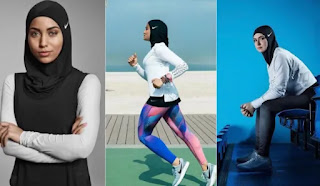Nike, one of the world's most iconic sportswear brands, has always been at the forefront of innovation and inclusivity. In recent years, the company has taken significant steps to embrace the Muslim market by expanding its product offerings and marketing strategies. From the release of performance-oriented hijabs to collaborations with Muslim athletes, Nike is making meaningful strides in catering to the diverse needs of Muslim consumers.
Understanding the Muslim Market
The Muslim market is vast and diverse, with over 1.8 billion Muslims worldwide, representing a significant consumer base. Recognizing the importance of diversity and inclusion, many global brands, including Nike, have sought ways to engage with this demographic.
Nike's Initiatives
Nike Pro Hijab: In 2017, Nike unveiled the Nike Pro Hijab, a sportswear item designed specifically for Muslim female athletes. The hijab is made from lightweight, breathable fabric, allowing for optimal performance and comfort. This move was a significant step towards addressing the underrepresentation of Muslim women in sports and empowering them to pursue their athletic goals.
Inclusive Marketing Campaigns: Nike has featured Muslim athletes in its marketing campaigns, promoting diversity and breaking stereotypes. Athletes like Manal Rostom and Bilqis Abdul-Qaadir have become prominent faces in Nike's marketing efforts, inspiring Muslim women around the world to participate in sports.
Eid Collection: Nike has also recognized the significance of cultural celebrations. The company has released special Eid collections, featuring sportswear and sneakers with designs inspired by Islamic culture, to mark the end of Ramadan.
Localized Marketing: Nike has been successful in localizing its marketing efforts. For example, in the Middle East, Nike has partnered with local influencers and athletes to resonate with the regional audience.
Benefits and Impact
Nike's strategy to embrace the Muslim market offers several benefits:
Inclusivity: Nike's initiatives promote inclusivity, making Muslim consumers feel seen and valued. This inclusivity extends to other diverse communities as well.
Market Growth: By catering to the Muslim market, Nike can tap into a significant and growing consumer base, potentially increasing its market share and revenue.
Inspiration: The presence of Muslim athletes in Nike's marketing campaigns and the availability of performance hijabs can inspire the next generation of Muslim athletes.
Social Impact: Nike's efforts contribute to broader discussions about diversity and representation, fostering positive social change.
Conclusion
Nike's strategy to embrace the Muslim market reflects a broader trend of inclusivity and diversity in the business world. By creating products and marketing campaigns that cater to the specific needs and cultural values of Muslim consumers, Nike is not only expanding its market reach but also sending a powerful message of acceptance and empowerment.
As the global marketplace becomes increasingly diverse, it's essential for brands to recognize the importance of catering to different communities and embracing their unique identities. Nike's approach serves as an inspiring example of how a global brand can adapt and evolve to meet the needs of a diverse and multicultural world.


